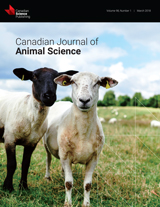Two experiments were performed to determine the chemical composition of by-product of passion fruit seed (BPFS) and to evaluate the performance, blood variables, carcass yield, meat quality, and oxidation of broilers fed diets containing increasing levels of BPFS. In experiment 1, a total of 60 twenty-one-day-old Cobb male broilers were distributed in a completely randomized design, with two treatments (reference feed and test diet) and five replicates of 6 birds each. Energy content in BPFS was 3945 kcal kg-1 of apparent metabolizable energy corrected for nitrogen balance and 10.68% crude protein. In experiment 2, a total of 864 one-day-old male Cobb broilers were distributed in a completely randomized design, with six treatments (control, 2.5%, 5.0%, 7.5%, 10%, and 12.5% BPFS) and six replicates of 24 birds each. Feed conversion linearly worsened (P < 0.05). At 21 d of age, blood triglyceride levels linearly decreased (P < 0.05). At 42 d, there was a linear decrease in villus height in the jejunum as the inclusion of BPFS increases. Meat quality was not affected by the different levels of BPFS. For lipid oxidation, used samples of thigh in a 6 × 3 factorial design (six levels of addition of BPFS and three storage periods) with four replications. In the treatments with 5% BPFS, the phenolic compounds present in the by-product led to a delayed and reduced oxidation. In conclusion, from 1 to 21 d and 1 to 42 d, BPFS can be used up to 5% in broiler diets without harming the parameters evaluated.
How to translate text using browser tools
26 July 2017
By-product of passion fruit seed (Passiflora edulis) in the diet of broilers
Leonardo Henrique Zanetti,
Alice Eiko Murakami,
Mayra Diaz-Vargas,
Ana Flávia Quiles Garcia Guerra,
Ivan Camilo Ospina-Rojas,
Guilherme Rodrigues do Nascimento,
Tatiana Carlesso dos Santos,
Paula Toshimi Matumoto Pintro
ACCESS THE FULL ARTICLE
It is not available for individual sale.
This article is only available to subscribers.
It is not available for individual sale.
It is not available for individual sale.
énergie
energy
métabolisation
metabolization
nutrition
nutrition
performance





